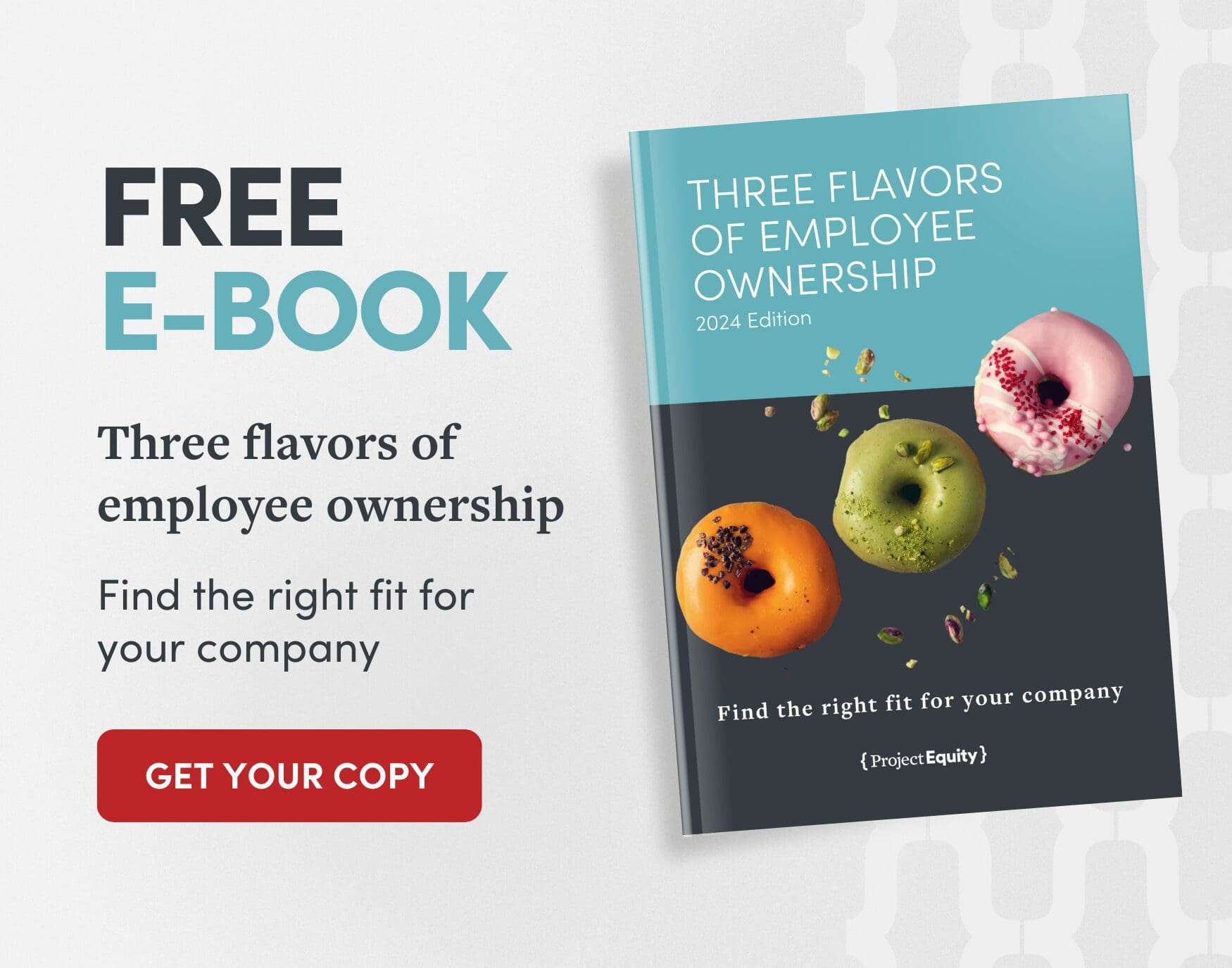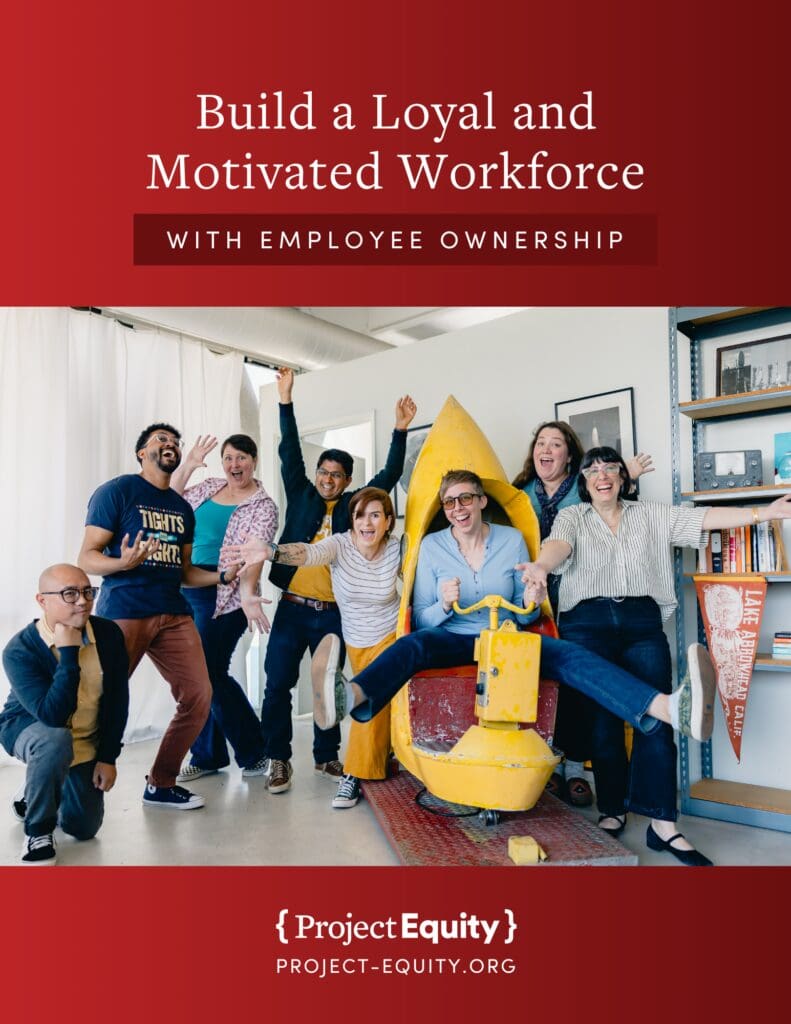Why employee ownership makes sense for Gen Z workers
- Michelle Philippon
In 2023, the share of Generation Z workers—people born between 1995 and 2012—in the labor force surpassed baby boomers according to the Department of Labor (DOL).
As more Gen Z employees enter the workforce and even move into management roles, and as the number of Gen Z workers continues to grow while numbers of other generations decrease, it’s increasingly important for business owners to pay attention to this generation and what they care about.
Attracting Gen Z workers is one thing; retaining Gen Zers isn’t easy. Gen Z workers move jobs as much as their millennial counterparts. A ResumeLab report found that an estimated 83% of Gen Z employees consider themselves to be “job hoppers.”
Thankfully, employee ownership (EO) can serve as a powerful way to both attract and keep Gen Z employees. Here are six reasons employee ownership appeals to Gen Z workers.
1. Employee ownership helps employees feel more connected to their jobs
Gen Zers are looking for workplaces that are more engaging. A MetLife survey found that Gen Z employees feel more depressed, isolated, lonelier and less successful than other generations.
Make a Gen Z worker an employee-owner and they will be more connected to their jobs and their colleagues. They will have a financial stake in the success of the company, and depending on the type of EO (worker cooperatives or potentially Employee Ownership Trusts, or EOTs), they could serve in a governance role.
Giving them an opportunity for greater involvement will appeal to Gen Z candidates, and once on the team, will help them feel more engaged and more successful.
2. Employee ownership gives employees better benefits
The MetLife report also found that just 50% of Gen Z surveyed had “decent” financial health. Many Gen Z employees rely on external financial support—from friends or family—to make ends meet.
A Gen Z employee-owner gets equity in the business. This is far more than their peers at non-EO businesses can say. Employee-owners have better benefits overall. According to a National Center for Employee Ownership study, 23% of employee-owners had access to childcare benefits, compared to 5% of non-employee-owners. And employee-owners were 2.6x more likely to receive tuition benefits from their employers.
3. Employee-owners earn more
Fortune found that Gen Zers measure financial success as having a net worth of $9,469,847—almost twice as much as Gen X. And a CareerBuilder survey showed that the top priority for Gen Z workers is higher pay.
As an employee-owners, Gen Z workers will likely earn more money. A study showed that employee-owners had 33% higher median income from wages than non-employee-owners. Equity also plays a role. As the business grows, so too will the value of the employee-owners’ equity. Offering employees equity is an attractive hiring incentive for Gen Z candidates. Higher earnings will incentivise them to not just stay but to work harder.
4. EO gives the work meaning
say a sense of purpose is important to overall job satisfaction and well-being
Employee-owned businesses truly value their employees. Workers have a stake and a voice in the company. This value-aligned, meaningful and purpose-driven work will appeal to Gen Z workers.
“The transparent nature of employee-owned companies has mass appeal to this generation’s preference for non-hierarchal structures,” said Hope Wiliams, the director of legislative advocacy for the Sustainable Economies Law Center. “It gives them a sense of belonging and agency, helping to combat the disillusionment many feel with traditional corporate structures. In an era where social impact and ethical leadership matter more than ever, EO offers a compelling alternative that aligns work with personal values and long-term goals.”
5. EO gives employees more career development opportunities
When surveying Gen Zers, HR Vision found that they desire career advancement opportunities. 57% of those surveyed expect to be promoted once per year, and 35% measure their personal success by how quickly they advance at work.
Another Gen Z survey listed their top professional motivators as personal development (35%) and a desire to prove themselves (28%). In other words, they’re seeking career advancement opportunities.
According to LinkedIn’s Employee Well-Being Report, Gen Z workers expressed a desire for more opportunities to move up (61%) and more opportunities to learn or practice new skills (76%).
Career development and advancement opportunities should be a priority for hiring and retaining Gen Z workers. This is built into most employee-owned companies. In the majority of EO businesses, workers have a voice and in many, there are leadership and training opportunities not available in non-EO companies. This will make your business more attractive to future employees and encourage your Gen Z workers to stay.
6. Employee-owners have a better work-life balance
A Randstad survey found that 74% of Gen Z respondents prioritized work-life balance over pay. This has been an overall shift since the pandemic. Many things contribute to a work-life balance including flexible working hours, manageable workloads, clear boundaries between work and personal life, a supportive work environment, adequate vacation time, and the ability to prioritize personal needs.
At most employee-owned companies, the workers have more control over their work schedules, giving a better work-life balance overall. They also have decreased stress and depression, positively affecting employee and family health and wellbeing.
The future of work: employee ownership and Gen Z
Employee ownership is more than just a succession strategy—it’s a way to create workplaces where workers feel valued, empowered and financially secure. By offering equity, career growth and meaningful work, EO aligns with Gen Z’s priorities and can help businesses attract and retain top talent.
“At its essence, EO creates an opportunity for reimagining what wealth and ownership means,” said Santiago Carrillo, the assistant director at Living Cities. “This seems to be aligned with Gen Z’s values and thoughts on traditional structures.”
As this generation continues to reshape the workforce, companies that embrace employee ownership will stand out. Investing in EO not only benefits employees but also strengthens businesses, creating a win-win for everyone.
Want more information about how employee ownership helps you to keep and retain employees?
- Explore more benefits of employee ownership.
- Discover how EO brings about an ownership culture at businesses.
- Check out our ownership stories and hear from workers why they love working at employee-owned businesses.
Ownership aligns with Gen Z’s desire for meaningful, purpose-driven work and stronger job connection because factors like transparency, voice in governance and alignment with values boost engagement and reduce isolation for Gen Z workers.
Employee ownership offers not only higher median wages (≈33 % according to one study) but also equity upside, better benefits like tuition and childcare and improved financial health—crucial for this debt-burdened generation .
Many employee-owned businesses emphasize autonomy, flexible schedules and self-management—directly echoing Gen Z’s demands for mental health support, flexible work and a work-life balance.
Many employee-owned businesses emphasize autonomy, flexible schedules and self-management—directly echoing Gen Z’s demands for mental health support, flexible work and a work-life balance.
Employee ownership often includes structured pathways for growth—peer learning, governance participation and leadership roles—which resonate with Gen Z’s high aspirations for annual advancement and professional development.
About the author
Michelle Philippon is the content manager at Project Equity, where she helps drive the organization’s storytelling by crafting and distributing content that showcases the power of employee ownership. A creative and results-driven content marketer, Michelle loves working with internal and external SMEs to provide useful insights to help small business owners, business advisors and economic developers achieve their goals.

Article details
Audience
Topic



